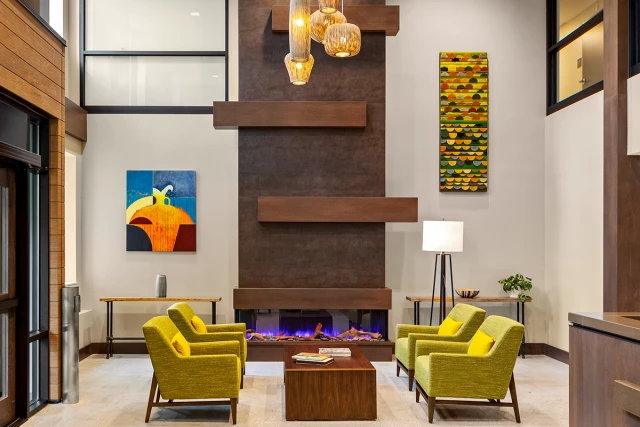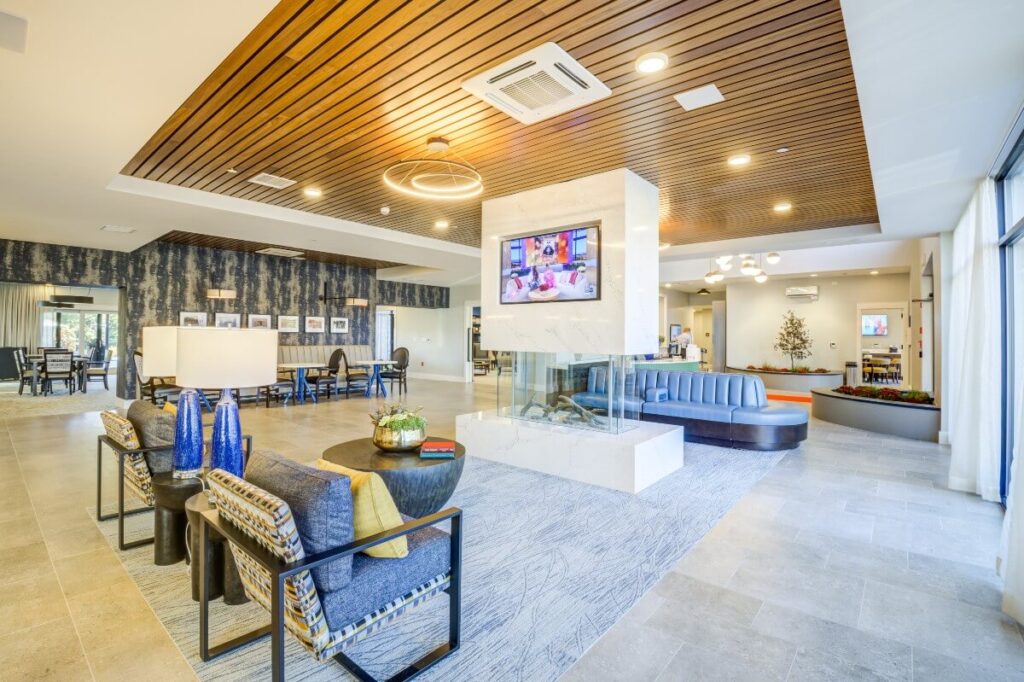Memory Care Massachusetts
Memory Care Massachusetts
Award-Winning Mind & Memory Care
Personalized, needs-based memory care to support individual abilities.
We take pride in celebrating our residents’ lives and tailoring our memory care experiences to them. Thoughtful touches, visual cues and amenities maximize wellness, while specially selected and trained care providers cultivate a sense of belonging, purpose and give round-the-clock care.
What Is Memory Care?
Memory care is a type of senior living designed to meet the unique needs of older adults with memory impairment, including varying forms of dementia, Alzheimer’s disease, and other neurological conditions that impact mobility or cognition, such as Parkinson’s disease.
As those with neurological conditions can be prone to wandering, mobility issues, forgetfulness and compromised senses that impact their overall safety, memory care programs focus on providing a secure, adaptive living environment.
Benchmark Senior Living's Mind and Memory Care programs have specially trained staff with providers being CDP (Certified Dementia Practitioner) certified and programming that go beyond providing care. We have used evidence based research to create an environment and programming experiences that support our residents’ sense of purpose and current capabilities while engaging all senses and aiming to preserve short and long-term memory.


Benchmark Dedicated Memory Care Communities In Massachusetts
Benchmark Memory Care Communities In Massachusetts
Benchmark Senior Living at Robbins Brook - Acton, MA
Benchmark at North Andover - Andover, MA
The Branches of North Attleboro - Attleboro, MA
Benchmark at Billerica Crossings - Billerica, MA
Benchmark Senior Living at Putnam Farm - Danvers, MA
The Branches of Framingham - Framingham, MA
Benchmark Senior Living at Forge Hill - Franklin, MA
Benchmark at Hanover - Hanover, MA
Benchmark at Haverhill Crossings - Haverhill, MA
Benchmark Senior Living at Leominster Crossings - Leominster, MA
The Village at Willow Crossings - Mansfield, MA
The Branches of Marlboro - Marlboro, MA
Chestnut Park at Cleveland Circle - Newton, MA
Evans Park at Newton Corner - Newton, MA
The Falls at Cordingly Dam - Newton, MA
Benchmark Senior Living on Clapboardtree - Norwood, MA
Benchmark Senior Living at Plymouth Crossings - Plymouth, MA
Benchmark Senior Living at Shrewsbury Crossings - Shrewsbury, MA
Benchmark Senior Living at Waltham Crossings - Waltham, MA
Benchmark at Orchard Valley - Wilbraham, MA

An award-winning program for individuals with memory loss offering individualized care and experiences to help them find joy in each new day.
Benchmark Senior Living's Mind & Memory Care communities provide residents a secure and supportive community with personalized care and curated experiences individualized for varying stages of Alzheimer's and dementia. Our dedicated caregivers provide 24/7 on-site care, are trained in caring for those with memory loss, and cultivate a sense of belonging and purpose. Thoughtfully designed living spaces engage the senses with visual cues to support cognition and enhance daily experiences while providing a secure space for residents to have the freedom to explore independently. Our memory care amenities, activities, and programming have all been specially designed to maximize wellness and stimulate the senses - from chef-inspired all-day sensory dining, journey stations, art and music therapy, gardening and more.

Our Memory Care Facilities
At Benchmark Senior Living Communities, individuals are celebrated, and personal connections are created with fellow residents and associates alike — with endless opportunities to live in the moment, while cherishing memories of the past.
Driven by a people-first philosophy, care is delivered by a team of associates who are Called to Care. Our focus is on ensuring every resident feels empowered, nurtured, and heard. Becoming part of a Benchmark community brings:
Holistic, Personalized Care:
Individualized care plans are created for each resident and designed to address changing needs. A comprehensive approach to care is supported by access to specialists, such as geriatric neurologists and psychiatrists, and the resident’s selected providers.
One Face of Care:
Residents benefit from continuous support of a designated team of Mind and Memory Care associates, providing desired familiarity, understanding and comfort with day-to-day activities. These individuals lead with compassion and patience and provide a direct communications line to families to stay connected and informed.
Commitment to Learning and Security:
Residents deserve a secure place to call home. We are always seeking new ways to evolve and exceed expectations with quality education in safety and infection control, empathy, and relationship-building.
Designed with Home in Mind:
Purposefully designed rooms and indoor and outdoor spaces deliver a sense of comfort, familiarity. Mind and Memory Care design elements are incorporated to minimize overstimulation, such as special lighting and contrasting color palettes.
Mind and Memory Care Dining:
Resident-centered dining approach creates positive mealtime experiences that encourage independence, with associates trained to recognize nonverbal cues to provide assistance. Resident food preferences influence meal choices aimed to stimulate appetite and maintain health.
Building and Nurturing Connections:
Through interviews and discovery sessions using TSO Life and family discussions, memories, interests, and experiences are uncovered. By really getting to know individuals, associates encourage participation in activities that nurture passions, build connections, and bring joy.
Dementia & Alzheimer's Care
Dementia & Alzheimer’s Care that combines the latest expertise with the utmost compassion.
In the world of senior care, where the complexities of Alzheimer’s disease and dementia are continually growing, Benchmark Senior Living stands out for our commitment to innovation and excellence in memory care. Our extensive training, dedicated leadership and pioneering programming distinguish us as leaders in compassionate assisted living and long-term memory care.
-
Benchmark’s Mind and Memory Care communities are designed to provide exceptional dementia care & Alzheimer's care.
-
We take pride in the fact that every Mind and Memory Care Director is a Certified Dementia Practitioner (CDP).
-
Our award-winning memory care offers a comprehensive approach tailored to the unique needs of each resident, ensuring a high quality of life.
-
With different levels of memory care available, we provide 24/7 support from associates who are extensively trained in managing care for those with memory loss.
-
Our multi-sensory environments and daily cognitive activities are specifically crafted to stimulate and engage residents, promoting both mental and emotional well-being.

Is It The Right Time For Memory Care?
Learn about your options and get personalized results in about 4 minutes.

Memory Care Cost
At Benchmark, we believe in upfront pricing to help inform and ease your decision-making.
The cost of memory care can vary widely depending upon the community’s location, its amenities, services provided, and more. We are committed to helping you understand exactly what goes into determining initial fees and monthly costs for our Memory Care communities and services. For more information on pricing and availability, visit our Memory Care Cost page to request a personalized quote today!
Learn more about the resources that can be used to cover the costs of senior living and get a personalized summary in about 4 minutes without sharing details about your finances with our Affordability Survey.
Learn More About Memory Care at Benchmark
How to Transition a Loved One into a Memory Care Community
Mind & Memory Care
Family Support in Memory Care Communities
Mind & Memory Care
Memory Care Assisted Living With So Much More
Dedicated Communities Built on Love, Trust and Expertise
Guided by Mind & Memory Experts:
Specialists in caring for those with memory loss help inform Benchmark’s Mind and Memory Care and programming approach. Benchmark Senior Living's Mind and Memory Care programs have specially trained staff with providers being CDP (Certified Dementia Practitioner) certified and programming that goes beyond providing care.
Support Mobility & Independence:
Benchmark Strong, a comprehensive exercise program, focuses on neuromuscular strength, balance and mind-body connection. This evidence informed approach incorporates flexibility training and postural muscle strengthening.
Wellness Prioritized:
Holistic approach to wellness with activities and events designed to address Six Dimensions of Wellness: intellectual, sense of purpose and fulfillment, physical, spiritual, social, emotional and sensory. From board games and walking clubs, to religious services and social luncheons, the calendar is extensive and routinely enhanced.
Exercise the Mind & Spirit:
Mind and Memory programs help connect residents to memories and encourage expression through various senses. Collaborative programming, such as group storytelling and memory boxes, inspire conversation and elicit fond memories. In addition, creating Zen programming uses a multi-sensory approach to enhance connection between associates and residents and facilitate relaxation.
Coordinated Family Communication:
Families stay up to date and informed through the Family Contact Liaison program, with proactive outreach around resident and community-specific information. Support Groups organized by our Corporate Director of Memory Care offer virtual and in-person support, open to all family and friends who want the support of others with a loved one who has Dementia or Alzheimer’s. We share experiences, tips and strategies to assist on this journey.
Financial Support Strategies*:
The Financial Concierge services program connects you with third-party services and provides a single point of contact to help with financial questions.
*Subject to additional fees
Memory Care FAQ
Memory care is a specialized form of long-term care designed for individuals with memory-related disorders such as Alzheimer's disease or dementia. These facilities provide a safe and supportive environment tailored to the unique needs of residents.
Key features of memory care include trained staff who understand the challenges of memory loss and how to provide appropriate care and safety measures, such as secure entrances and exits to prevent wandering, and structured activities to stimulate cognitive function, inclusiveness and maintain well-being.
Memory care facilities offer personalized care plans, tailored activities, and support for families and caregivers. Overall, memory care aims to enhance the quality of life for individuals with memory impairments while providing a supportive and enriching environment.
For those seeking more information on memory care, understanding its specialized approach and benefits can help in making informed decisions about care options for loved ones.
Find a Benchmark Senior Living Mind & Memory Care Community Near You
The average monthly cost for memory care can vary widely depending on factors such as location, facility amenities, level of care needed, and specific services provided. Benchmark Senior Living’s average monthly cost for memory care typically ranges from $4,000 to $8,000 or more.
In some regions, particularly areas with higher costs of living, memory care costs may exceed this range. Additionally, facilities that offer specialized services, luxury amenities, or higher levels of care may have higher fees.
Typical memory care costs cover room and board, meals, assistance with activities of daily living (ADLs), medication management, and memory care services. Additional fees may apply for specialized care needs, medication administration, and other services.
Learn more about what’s included in the cost of memory care at our blog. When considering memory care options, it's essential to inquire about the specific services and amenities included in the monthly cost, as well as any additional fees or charges.
Our Financial Concierge services program connects you with third-party services and provides a single point of contact to help with financial questions.*
At Benchmark, we believe in upfront pricing to help inform and ease your decision-making. We are committed to helping you understand exactly what goes into determining initial fees and monthly costs for things like our personalized, needs-based care.
Learn more about the resources that can be used to cover the costs of senior living and get a personalized summary in about 4 minutes without sharing details about your finances with our Affordability Survey.
*Subject to additional fees
For more information on pricing and availability, visit our Memory Care Cost page to request a personalized quote today!
Deciding when to move from assisted living to memory care can be a complex and individualized decision that depends on several factors, including the progression of the individual's cognitive impairment, safety concerns, and the level of support they require. Here are some signs that it may be time to consider a transition from assisted living to memory care:
Increased Cognitive Decline:
If the individual's cognitive abilities have significantly declined to the point where they are unable to safely manage activities of daily living (ADL’s), such as bathing, dressing, eating, or taking medication, memory care may be more
Wandering or Exit-Seeking Behaviors:
If the individual has started exhibiting wandering behaviors or frequently tries to leave the assisted living facility, a memory care neighborhood with its secured environment may provide a safer living situation.
Increased Care Needs:
If the individual requires a higher level of supervision and assistance due to memory loss, confusion, or other cognitive impairments, memory care may be able to offer the additional specialized support they need.
Safety Concerns:
If the individual's safety is compromised due to forgetfulness, confusion, or inability to recognize potential dangers, transitioning to a memory care neighborhood with enhanced safety measures may be necessary.
Social Isolation:
If the individual is withdrawing from social activities or experiencing social isolation due to cognitive decline, memory care neighborhoods often offer structured activities and programs specifically designed to engage residents with memory impairments.
Ultimately, the decision to move from assisted living to memory care should be made in collaboration with the individual, their family members or loved ones, and healthcare professionals, taking into account the individual's specific needs, preferences, and safety considerations. Regular assessments and discussions with the assisted living staff can help determine when it may be appropriate to consider a transition to memory care.
Wondering if the move from assisted living to memory care is right for you or your loved one? Learn about your options and get personalized results in about 4 minutes with our memory care survey.
Memory care assisted living refers to a specialized type of assisted living facility that provides care and support tailored specifically to individuals with memory impairments, such as Alzheimer's disease or other forms of dementia. These facilities combine the features of traditional assisted living with additional services and resources designed to meet the unique needs of residents with memory-related disorders.
Find a Benchmark Senior Living Memory Care Assisted Living Community near you
Assisted living and memory care are both types of senior living facilities, but they cater to different populations and have distinct differences in terms of the services and support they provide. Here are the key differences between assisted living and memory care:
-
Population Served:
- Assisted Living: Assisted living facilities typically cater to older adults who may need assistance with activities of daily living (ADLs) such as bathing, dressing, medication management, and meal preparation. Residents in assisted living may have varying levels of cognitive function, ranging from fully independent to mild cognitive impairment.
- Memory Care: Memory care facilities are specifically designed for individuals with memory impairments, such as Alzheimer's disease or other forms of dementia. These facilities specialize in providing care and support tailored to the unique needs of residents with cognitive decline, including those who may be prone to wandering or exhibit challenging behaviors.
-
Staff Training and Expertise:
- Assisted Living: Staff members in assisted living facilities are trained to assist residents with activities of daily living and provide basic medical care, but they may not have specialized training in dementia care.
- Memory Care: Staff members in memory care facilities receive specialized training in dementia care, including understanding the behaviors associated with memory loss, effective communication techniques, and how to create a supportive and safe environment for residents with cognitive impairments, like Alzheimer’s or dementia.
-
Environment:
- Assisted Living: Assisted living facilities may have a more homelike environment, with private or semi-private apartments or rooms, communal dining areas, and common spaces for socializing and recreational activities.
- Memory Care: Memory care facilities often have a more structured and secure environment, with features such as monitored or secured entrances and exits to prevent wandering, as well as specialized design elements to reduce confusion and promote independence.
-
Programming and Activities:
- Assisted Living: Assisted living facilities offer a range of activities and programs designed to promote socialization, physical activity, and mental stimulation. These may include exercise classes, arts and crafts, outings, and social events.
- Memory Care: Memory care facilities offer programming and activities specifically tailored to the needs and abilities of residents with memory impairments. Activities may focus on reminiscence therapy, sensory stimulation, music therapy, and other interventions designed to engage residents and support cognitive function.
-
Level of Care:
- Assisted Living: Assisted living provides varying levels of care depending on the needs of individual residents, ranging from minimal assistance with activities of daily living (ADLs) to more extensive support with medication management and healthcare coordination.
- Memory Care: Memory care offers a higher level of supervision and support for residents with cognitive impairments, including assistance with activities of daily living (ADLs), specialized care for behavioral and psychological symptoms of dementia (BPSD), and 24-hour monitoring to ensure safety and well-being.
Overall, while both assisted living and memory care provide senior living support for older adults, memory care facilities offer specialized services and a structured environment specifically designed to meet the unique needs of individuals with memory loss.
Search Benchmark Assisted Living Facilities
Search Benchmark Mind & Memory Care Facilities
When considering a memory care facility for a loved one, it's essential to understand what services and amenities they typically offer. Here's what you can expect from a memory care facility:
-
Safe and Secure Environment:
Memory care facilities are designed with safety in mind. They often feature secure entrances and exits to prevent wandering, as well as monitored or locked doors to ensure the safety of residents with memory impairments. -
Specialized Staff:
Memory care facilities have staff members who are specially trained in dementia care. They understand the unique needs of individuals with memory loss and are skilled in providing compassionate and supportive care. -
Personalized Care Plans:
Each resident in a memory care facility receives an individualized care plan tailored to their specific needs, preferences, and abilities. These care plans may address medication management, assistance with activities of daily living (ADLs), behavioral interventions, and more. -
Structured Activities:
Memory care facilities offer structured activities and programs designed to engage residents and promote cognitive stimulation, social interaction, and emotional well-being. These activities may include music therapy, art therapy, reminiscence therapy, and sensory stimulation exercises. -
Nutritious Meals:
Memory care facilities typically provide nutritious meals and snacks tailored to the dietary needs and preferences of residents. Specialized diets, such as those for individuals with swallowing difficulties or specific medical conditions, are often accommodated. -
24-Hour Supervision:
Memory care facilities provide round-the-clock supervision and support for residents. Staff members are available at all times to assist with any needs or emergencies that may arise. -
Family Involvement:
Memory care facilities encourage family involvement in the care of their loved ones. Family members are often welcome to participate in activities, visit their loved ones, and attend care plan meetings to stay informed about their care. -
Support Services:
Memory care facilities may offer additional support services for families, including educational resources, support groups, and counseling to help them navigate the challenges of caring for a loved one with dementia. -
Healthcare Coordination:
Memory care facilities often have partnerships with healthcare providers and specialists to ensure residents receive comprehensive medical care. They may offer on-site medical services or coordinate transportation for residents' appointments. -
Comfortable Living Spaces:
Memory care facilities typically provide comfortable and homelike living spaces for residents, including private or semi-private rooms or apartments, communal areas for socializing and activities, and outdoor spaces for relaxation and recreation.
Overall, memory care facilities aim to create a supportive and enriching environment for individuals with memory impairments, helping them to maintain dignity, independence, and quality of life while receiving the care and assistance they need.
Find a Benchmark Senior Living Memory Care Facility Near You
Memory care and dementia care are terms often used interchangeably, but there are subtle differences between the two concepts.
Memory care encompasses a broader range of care services that address the needs of individuals with memory loss, which includes dementia. Memory care can encompass a variety of settings, including in-home care provided by family members or professional caregivers, assisted living facilities that offer memory care services, nursing homes with dementia care units, and standalone dementia care facilities.
Dementia care encompasses a broader range of care services that address not only memory impairment but also other symptoms and challenges associated with dementia, such as changes in behavior, communication difficulties, and functional decline. Benchmark Senior Living’s Memory care program involves a holistic approach to care that considers physical, emotional, and social well-being.
Overall, dementia care is a subset of memory care that specifically focuses on providing specialized care and support for individuals with dementia, aimed at meeting the needs of individuals across various stages of the condition.
Learn More About Our Memory Care
Request More Information About Memory Care in Massachusetts
Discover the benefits Benchmark Senior Living memory care communities offer seniors and their families.
- Personalized, needs-based care
- Dedicated associates and care teams
- Engaging programming and activities
- Upscale amenities and expansive services
- Award-winning dining programs
- Purposefully designed communities
- And much more!
Get In Touch
Contact us today to learn more about our award-winning memory care!


